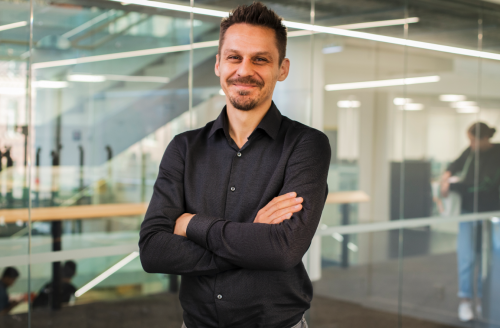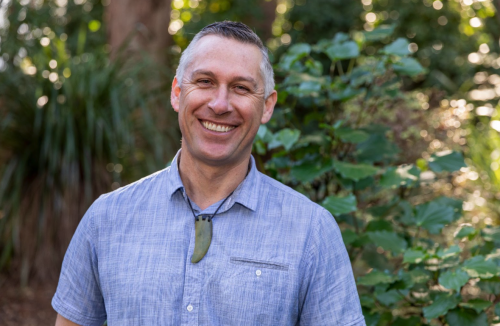What is Veracity Technology?
Q & A with project Leader Assoc Prof Markus Luczak-Roesch and Vision Mātauranga Leader Assoc Prof Māui Hudson (Te Whakatohea, Ngā Ruahine, Te Mahurehure)
SfTI has announced the launch of the Veracity Technology Spearhead research project. Following Mission Design, a team has been awarded $2 million over two years to develop technology to find solutions to ‘veracity blindspots’ and grow trust in data transactions.
But what does this mean for Aotearoa? And, why is the veracity of our data transactions so important, particularly for Māori Data? Below, Vision Mātauranga lead, Associate Professor Māui Hudson and project lead, Associate Professor Luczak-Roesch answer some questions:
What is veracity? [Markus Luczak-Roesch]
Most simply it is a sense of truth - but we are looking at veracity as the handing over and the receiving of a thing [product, service, data] in a transaction, and the assurance that everything each party needs to know about the transaction is trustworthy, truthful and authentic.

What does veracity mean from a Mātauranga Māori perspective? [Māui Hudson]
Veracity is about ensuring the integrity of data or products as it moves into different spaces.
Digitisation of Māori knowledge and data enhances access but also increases the possibility of misappropriation and misinterpretation. Maintaining the integrity of the mātauranga is an important outcome for iwi.

What does this mean for Aotearoa’s products and services? [Markus Luczak-Roesch]
Veracity is best explained by example: If I have an apple, then I want to know whether I can trust all claims made about that apple, where it's from, how it grew and whether the shop I bought it from is allowed to sell it. Or if I am selling apples on an international market, I want to check whether the store overseas actually sells my apples with my label on
them.

We are looking to develop cutting edge technology, which will support verifying this kind of information in a way that is scalable, based on open standards and accessible to all. This will ultimately make it harder for individuals and organisations with bad intentions to deceive, misappropriate and defraud; and it will make it easier to find and penalise actors who do so.
Does this just apply to natural products? [Markus Luczak-Roesch]
This applies to data of all kinds. Knowing that data is true, where it came from and whose it is, is becoming harder and harder to trace. This creates an erosion of trust.
Why is Veracity increasingly important? [Markus Luczak-Roesch]
We are increasingly living in a data-driven world. Protecting our data and knowing that data is correct is harder than ever. We need digital infrastructures built for security and trust to ensure veracity. Ransomware attacks where data is stolen, replicated or lost can cause huge damage to trust in a business or organisation, plus have a negative impact on individuals whose data is affected. But even the fact that social media sites use people’s uploaded photos for developing algorithms to classify our mood or political positions based on facial expressions, for example, without most people being aware of it, shows how important it is that we increase transparency in the digital infrastructures we use every day.
What does artificial intelligence have to do with this? [Markus Luczak-Roesch]
Artificial intelligence (AI) is the use of computer algorithms to learn patterns from large quantities of data, which then allow for recommending products or news items to certain groups of people on social media sites, for example. AI is also increasingly applied to make decisions about home loans, life insurance policies or whether a person gets hired out of a pool of applicants. Veracity is critically important in the context of AI, because people need to know which algorithm made a decision about their life insurance application and why (Did the algorithm access data it shouldn't access for the decision? Is the algorithm unfair against certain groups of people?).
As AI becomes more a part of the world around us we need greater transparency.
What are we going to do? [Markus Luczak-Roesch]
This Spearhead research project will look at the universal properties of veracity (trustworthiness, truthfulness and authenticity), no matter whether we want to assess the veracity of a natural product, a digital asset or an algorithmic decision.
We will then look at what technical infrastructure New Zealand as a country needs to put in place to enable trustworthy, truthful and authentic exchanges of natural and digital assets in which not only human actors are involved but in which also algorithms/artificial intelligence is performing actions - we will build a demonstrator of such an infrastructure.
How will this specifically benefit Māori knowledge and data? [Māui Hudson]
My work includes conceptual approaches to tagging Māori data using Traditional Knowledge Labels (TK Labels). This is a way of identifying and tracing traditional knowledge that can be applied to indigenous cultures across the world. However, the Veracity Spearhead research project is an opportunity to help develop the technical data science solutions to maintain transparency and veracity around Māori provenance as it moves through the data ecosystems using the TK labels.